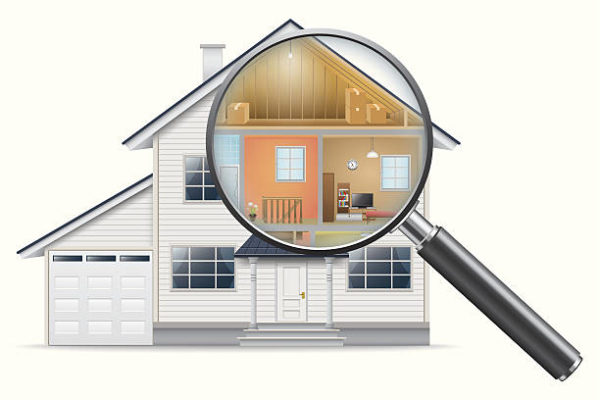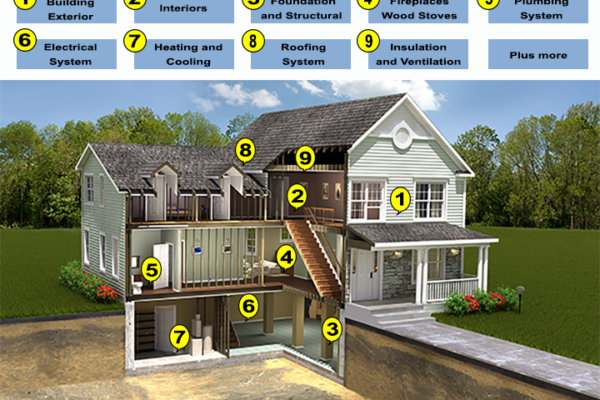An Important Step in The Home Buying Process
When it comes to buying a home, one of the most crucial steps in the process is the home inspection. Understanding what a home inspection entails and its significance can help you make an informed decision when purchasing a property. In this comprehensive guide, we will delve into the world of home inspections, exploring what they are, what they encompass, and why they are an essential part of the home-buying journey.
What Is A Home Inspection?
Let’s start with the basics. What is a home inspection? At its core, a home inspection is a visual, non-invasive snapshot of the condition of a home at the time of the inspection. It is a thorough assessment carried out by a trained and qualified home inspector. The primary purpose of a home inspection is to provide you with a clear understanding of the property’s condition, including any potential significant defects that may influence your buying decision.
During a typical home inspection, which usually takes between 2 and 3 hours, the inspector meticulously examines various aspects of the property. The duration of the inspection can vary depending on the size and condition of the home. Now, let’s take a closer look at what home inspectors focus on.

What Do Home Inspectors Look At?
Home inspectors take on the role of detectives, examining every nook and cranny of the property. They leave no stone unturned, both figuratively and literally. Here’s a breakdown of what home inspectors scrutinize:
Roof
Inspecting the roof is a critical part of the process. Home inspectors look for roof penetrations, signs of damage, possible leaks, and issues with vents, flashing, skylights, chimneys, trim, gutters, and downspouts. They also assess the condition of eaves, soffits, and fascia.
Foundation
Foundation issues can be financially burdensome to address. Inspectors carefully check for evidence of damage, such as cracks, water penetration, or foundation movement. They examine the exterior, basement, and crawl spaces.
Exterior
The exterior of the property is thoroughly inspected. This includes decks, porches, walkways, and railings. The garage or shed is noticed, and inspectors ensure that the garage door opener functions correctly. Additionally, they evaluate the yard’s grading and drainage system to prevent potential flooding.
Mechanical Systems
Inspectors assess the plumbing system, examining all plumbing fixtures and faucets, water pressure, and visible pipes. They also help locate the house’s main water shutoff valve. Electrical systems are addressed, too. The inspector identifies the type of wiring in the home, checks the electrical panel, breakers, and fuses for any issues or fire hazards, and informs you about necessary electrical upgrades. Heating and cooling systems receive a comprehensive inspection, including the furnace, ductwork, insulation, and ventilation. They can provide insights into the age and efficiency of the furnace and whether it might need replacement in the near future. Additionally, they inspect the water heater and offer an estimate of when it may require replacement.
Fireplace
If the home boasts a fireplace, whether gas or wood-burning, inspectors ensure it operates safely and efficiently. They check the damper, door, and hearth and provide recommendations for required maintenance.
The Comprehensive Home Inspection Steps
A full home inspection covers an extensive list of components, systems, and structural elements. The goal is to provide you with a comprehensive overview of the property’s condition. Here’s a summary of the steps involved in a home inspection:
- Roof Inspection: Assessing the condition of the roof, including penetrations, damage, and potential issues with various roof components.
- Foundation Examination: Checking for signs of foundation damage, such as cracks, water penetration, or movement.
- Exterior Inspection: Thoroughly examine the exterior of the property, including decks, porches, walkways, railings, garage or shed, and yard grading and drainage.
- Mechanical Systems Evaluation: Inspecting the plumbing system, electrical wiring, panel, breakers, and fuses, as well as assessing heating, cooling, and insulation systems.
- Fireplace Assessment: Ensuring the safe and proper functioning of fireplaces, whether gas or wood-burning.
The Value of Being Present
Apart from alerting you to potential issues with your new home, a full home inspection also provides a valuable learning opportunity. Being present during the inspection allows you to gain insights into the inner workings of your property. This knowledge can be incredibly useful in the future as you become more familiar with your home’s unique features and maintenance requirements.
In summary, a home inspection is a crucial step in the home-buying process. It is a comprehensive evaluation carried out by professionals to ensure that you are well informed about the condition of the property you intend to purchase. By understanding the key components of a home inspection and its significance, you can navigate the home-buying journey with confidence, armed with the knowledge needed to make informed decisions about your investment. Remember that while a home inspector assesses the property’s condition, your real estate agent can guide you on how to respond to any issues identified during the inspection.
So, when you’re in the midst of buying a home, always remember that an important step for purchasing a home is a thorough and diligent home inspection. It’s a smart investment in your future, ensuring that your new home is a place of comfort and security for years to come.
The Role of Home Inspection in the Buying Process
Now that we’ve covered the essential aspects of what a home inspection entails let’s delve deeper into why it plays a pivotal role in the home-buying process.
Informed Decision-Making
One of the primary reasons for conducting a home inspection is to empower the prospective buyer with knowledge. It provides an unbiased assessment of the property’s condition. Armed with this information, you can make informed decisions about whether to proceed with the purchase or negotiate repairs or concessions with the seller.
Imagine you’re in the final stages of negotiating the purchase of your dream home. The home inspection report reveals some unexpected issues, such as a leaky roof or outdated electrical wiring. Without this critical information, you might have unknowingly inherited costly repairs after closing the deal. However, with a comprehensive inspection report in hand, you can make decisions that align with your budget and priorities.
Negotiating Tool
A home inspection can serve as a powerful negotiating tool. Suppose the inspection uncovers significant defects or necessary repairs. In that case, you can use this information to renegotiate the purchase price or request that the seller address the issues before the sale is finalized. This negotiation process can potentially save you thousands of dollars and ensure that you are not burdened with unexpected expenses once you move in.
It’s important to remember that while the home inspector’s role is to identify the condition of the residence, your real estate agent plays a crucial role in advising you on what repair requests or concessions are reasonable and fair. Their expertise can help you navigate the negotiation process effectively.
Peace of Mind
Buying a home is a significant investment, and it’s natural to have concerns about the property’s condition. A thorough home inspection can provide you with peace of mind. It validates that you are making a well-informed decision and that the property is in the condition you expect it to be.
Knowing that a professional has meticulously assessed the home and provided a detailed report can alleviate anxieties associated with the purchase. It allows you to move forward with confidence, knowing that you are making a sound investment in your future.
Long-Term Planning
Beyond the immediate benefits of a home inspection, the information gathered during this process can be invaluable for long-term planning. For instance, if the inspection report highlights that the roof has a few more years of life left, you can budget for its replacement in the future. If electrical upgrades are recommended, you can plan for those as well.
Additionally, understanding the property’s condition allows you to prioritize maintenance and repairs. By addressing issues early on, you can prevent them from becoming more significant and costly problems down the road. This proactive approach to homeownership can save you money and preserve the value of your investment.
Educating Homeowners
Home inspections not only benefit buyers but also educate homeowners. As a new homeowner, the insights gained during the inspection can help you understand your property better. You’ll learn about the location of critical systems, such as the main water shutoff valve or electrical panel. This knowledge can be invaluable in emergencies or when you decide to undertake home improvement projects.
Moreover, home inspectors often provide recommendations on maintenance and upkeep. Following their advice can extend the lifespan of various components in your home and ensure that it remains a safe and comfortable environment for you and your family.
Conclusion
In the realm of buying a home, a home inspection is not just a formality; it’s a vital step that should always be taken. It serves as a safeguard, protecting your investment and ensuring that you make a well-informed decision. From negotiating better terms to gaining peace of mind and planning for the future, the benefits of a thorough home inspection are far-reaching.
So, as you embark on your journey towards homeownership, remember that understanding the role of a home inspection and appreciating its importance can make all the difference. It’s not just about buying a home; it’s about securing your future and creating a place where you can build cherished memories for years to come.
You can follow us on Social Media
For more information, you can contact us!

